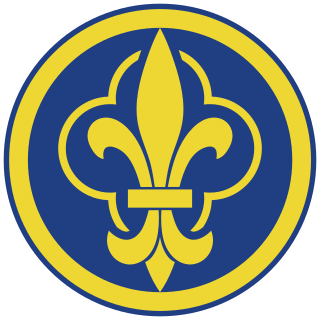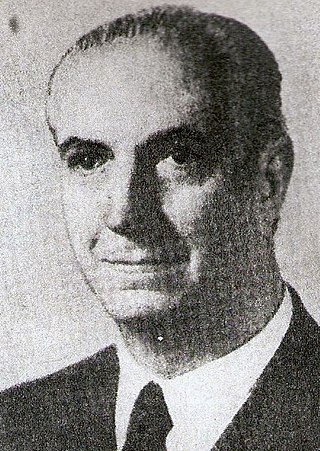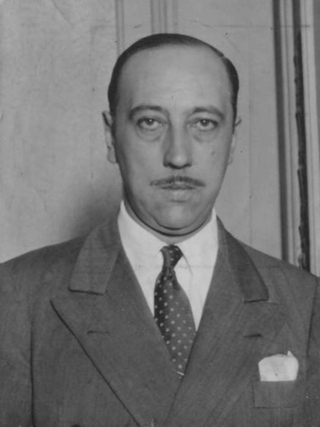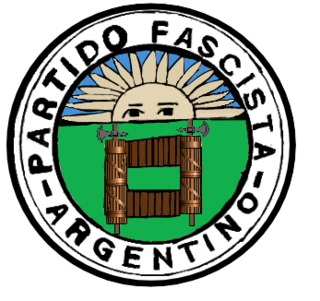Related Research Articles

Charles-Marie-Photius Maurras was a French author, politician, poet, and critic. He was an organizer and principal philosopher of Action Française, a political movement that is monarchist, anti-parliamentarist, and counter-revolutionary. Maurras also held anti-communist, anti-Masonic, anti-Protestant, and anti-Semitic views, though he was highly critical of Nazism, referring to it as "stupidity". His ideas greatly influenced National Catholicism and integral nationalism, with a major tenet of his views being that "a true nationalist places his country above everything".

Action Française is a French far-right monarchist political movement. The name was also given to a journal associated with the movement.

The 6 February 1934 crisis was an anti-parliamentarist street demonstration in Paris organized by multiple far-rightist leagues that culminated in a riot on the Place de la Concorde, near the building used for the French National Assembly. The police shot and killed 15 demonstrators. It was one of the major political crises during the Third Republic (1870–1940). Leftist Frenchmen claimed it was an attempt to organize a fascist coup d'état. According to historian Joel Colton, "The consensus among scholars is that there was no concerted or unified design to seize power and that the leagues lacked the coherence, unity, or leadership to accomplish such an end."
Falangism in Latin America has been a feature of political life since the 1930s as movements looked to the national syndicalist clerical fascism of the Spanish state and sought to apply it to other Spanish-speaking countries. From the mid-1930s, the Falange Exterior, effectively an overseas version of the Spanish Falange, was active throughout Latin America in order to drum up support among Hispanic communities. However, the ideas would soon permeate into indigenous political groups. The term "Falangism" should not be applied to the military dictatorships of such figures as Alfredo Stroessner, Augusto Pinochet and Rafael Trujillo because while these individuals often enjoyed close relations to Francisco Franco's Spain, their military nature and frequent lack of commitment to national syndicalism and the corporate state mean that they should not be classed as Falangist. The phenomenon can be seen in a number of movements both past and present.
Fascism in South America is an assortment of political parties and movements modelled on fascism. Although originating and primarily associated with Europe, the ideology crossed the Atlantic Ocean in the interwar period and had an influence on South American politics. The original Italian fascism had a deep impact in the region. Although the ideas of Falangism probably had the deepest impact in South America, largely due to Hispanidad, more generic fascism was also an important factor in regional politics.
Manuel Gálvez was an Argentine novelist, poet, essayist, historian and biographer.
Rodolfo Irazusta was an Argentine writer and politician who was one of the leading lights of the nationalist movement of the 1920s and 1930s. He collaborated closely with his younger brother Julio Irazusta throughout his career.

Julio Alberto Gustavo Irazusta was an Argentine writer and politician who was one of the leading lights of the nationalist movement of the 1920s and 1930s. He collaborated closely with his older brother Rodolfo Irazusta throughout his career.

Father Julio Meinvielle was an Argentine priest and prolific writer. A leading Roman Catholic Church thinker of his time, he was associated with the far right tendency within Argentine Catholic thinking. As a polemicist he had a strong influence on the development of nacionalismo.

Mario Octavio Amadeo was an Argentine conservative nationalist politician, diplomat and writer who served as a minister in the government of Eduardo Lonardi. He belonged to the highly influential right-wing tendency prominent in Argentine politics either side of the Second World War.

Ernesto Palacio was an Argentine historian and part of a generation of right-wing nationalist intellectuals active from the 1920s. Their ideology is referred to as nacionalismo.

Nimio de Anquín (1896–1979) was an Argentine Thomist writer and fascist politician. Seeking to combine European models of fascism with his own attachment to the Catholic Church he led several movements and for a time had a strong following. Subsequently, however, he lost political influence, and his later life was mainly focused on his academic career.

The Argentine Fascist Party was a fascist political party in Argentina from 1932 until its official disbandment in 1936, when it was succeeded by the National Fascist Union. Founded by Italian Argentines, the party was formed as a breakaway faction from Argentina's National Fascist Party. It was based upon Italian fascism and was recognized by Benito Mussolini's National Fascist Party in 1935. In the 1930s the party became a mass movement, particularly in the Córdoba reguon. Nicholás Vitelli led the PFA's branch in Córdoba until his death in 1934, when Nimio de Anquín took the leadership of the party.

The National Fascist Party of Argentina was a fascist political party that was formed in 1923.

The National Fascist Union was a fascist political party formed in Argentina in 1936, as the successor to the Argentine Fascist Party.
Roberto de Laferrère was an Argentinean writer and political activist. He was one of the leading figures in the nationalist movement active amongst a group of leading intellectuals in the 1930s.
The Republican League was a fascist movement in Argentina founded by Roberto Laferrere and Rodolfo Irazusta in 1929. The party borrowed heavily from the ideology and structure of the French integrist movement Action Française whose ideas had been disseminated in Argentina by polemicists such as Juan Carulla.

Brigadier General Juan Bautista Molina was an Argentine military commander and a pro-Nazi Argentine ultranationalist who led the Nationalist Liberation Alliance (ALN).

The Nationalist Liberation Alliance, originally known as the Argentine Civic Legion from 1931 to 1937, the Alliance of Nationalist Youth from 1937 to 1943, and then using its final name from 1943 to 1955, was a Nacionalista and fascist movement.
Junta de la Victoria was an Argentinian social movement that mobilized women against fascism, supporting democracy domestically and abroad. Founded on September 13, 1941 by upper-class women, Communists, rural Jewish women, and wives of foreign diplomats, Junta had 45,000 members in 125 different chapters around the country. Junta collected supplies, made goods, and donated money to the Allied war effort. The founders saw rising nationalism and fascism in Argentina as inherently based on Europe, saying that, "Allied and Argentine struggles for liberty and democracy were intertwined".
References
- 1 2 3 4 5 6 7 Philip Rees, Biographical Dictionary of the Extreme Right Since 1890 , Simon & Schuster, 1990, p. 55
- ↑ Sandra McGee Deutsch, Las Derechas, 1999, pp. 195-6
- 1 2 Roger Griffin & Matthew Feldman, Fascism: The "Fascist Epoch", 2004, p. 353
- ↑ Sandra McGee Deutsch, Las Derechas, 1999, pp. 235-6
- ↑ Graciela Ben-Dror, The Catholic Church and the Jews, 2009, p. 87
- ↑ Michael A. Burdick, For God and the Fatherland, 1995, p. 30
- ↑ F. Finchelstein, The Ideological Origins of the Dirty War: Fascism, Populism, and Dictatorship in Twentieth Century Argentina, Oxford University Press, 2014, p. 59
- ↑ Sandra McGee Deutsch, Las Derechas, 1999, p. 197
- ↑ Cyprian Blamires, World Fascism, 2006, p. 56
- ↑ Robert A. Potash, The Army & Politics in Argentina: 1928-1945, 1969, p. 67
- 1 2 3 C.L. Callahan, The Impact of the Spanish Civil War on Argentine Nationalist Intellectual Thought Archived 2018-08-08 at the Wayback Machine